2024 Release Notes
New functionality and system improvements released in 2024:
November 2024
New Features Released in November 2024: Biggy, New location for Assign Incident button, Automated Incident Analysis API, Increased integration limits, and more.
Biggy
Improving service reliability and operational efficiency is now easier than ever with Biggy.
Biggy brings you AI-powered incident management by uncovering hidden data, transforming it into insights, and delivering it in natural language. Biggy accelerates incident investigation by combing through infrastructure data and knowledge to surface highly relevant insights that help the team make smarter decisions, improve productivity, and scale incident management.
Biggy is available for Slack or Microsoft Teams so you can ask questions right where you work and receive answers in easy-to-understand language.
See the Biggy documentation for more information!
If your organization is interested in Biggy, contact your BigPanda Account Team.
Assign Incident Button Location Change
To improve the consistency of user experience, the location of the assign incident button has changed. The button is now fixed to the right side of the incident action options, as pictured below.

Automated Incident Analysis API
Customers using the Advanced Insight Module can now access the Automated Incident Analysis API. This new endpoint allows you to generate AI Analysis summaries from external tools.
See the Automated Incident Analysis API documentation for more information.
System Improvements - November 2024
(Integration Manager) BPQL now supports wildcards for IN and NOT IN operators.
Several custom integrations have had minor updates to fit standard integration features:
AppDynamics and NewRelic integrations will now receive a 201 message on successful payload. New error messages were added to assist troubleshooting failed payloads.
AutoShare Quota limit increased x10
October 2024
New Features Released in October 2024: Unified Analytics Report Manager, BigPanda Smart Search, maintenance plan management improvements, Microsoft Teams Workflows integration, and more.
Report Manager
Sharing insights from Unified Analytics to users outside of BigPanda is now easier than ever. The new Report Manager enables you to schedule and send snapshots of your dashboards to stakeholders via email, even if they do not have a BigPanda account.
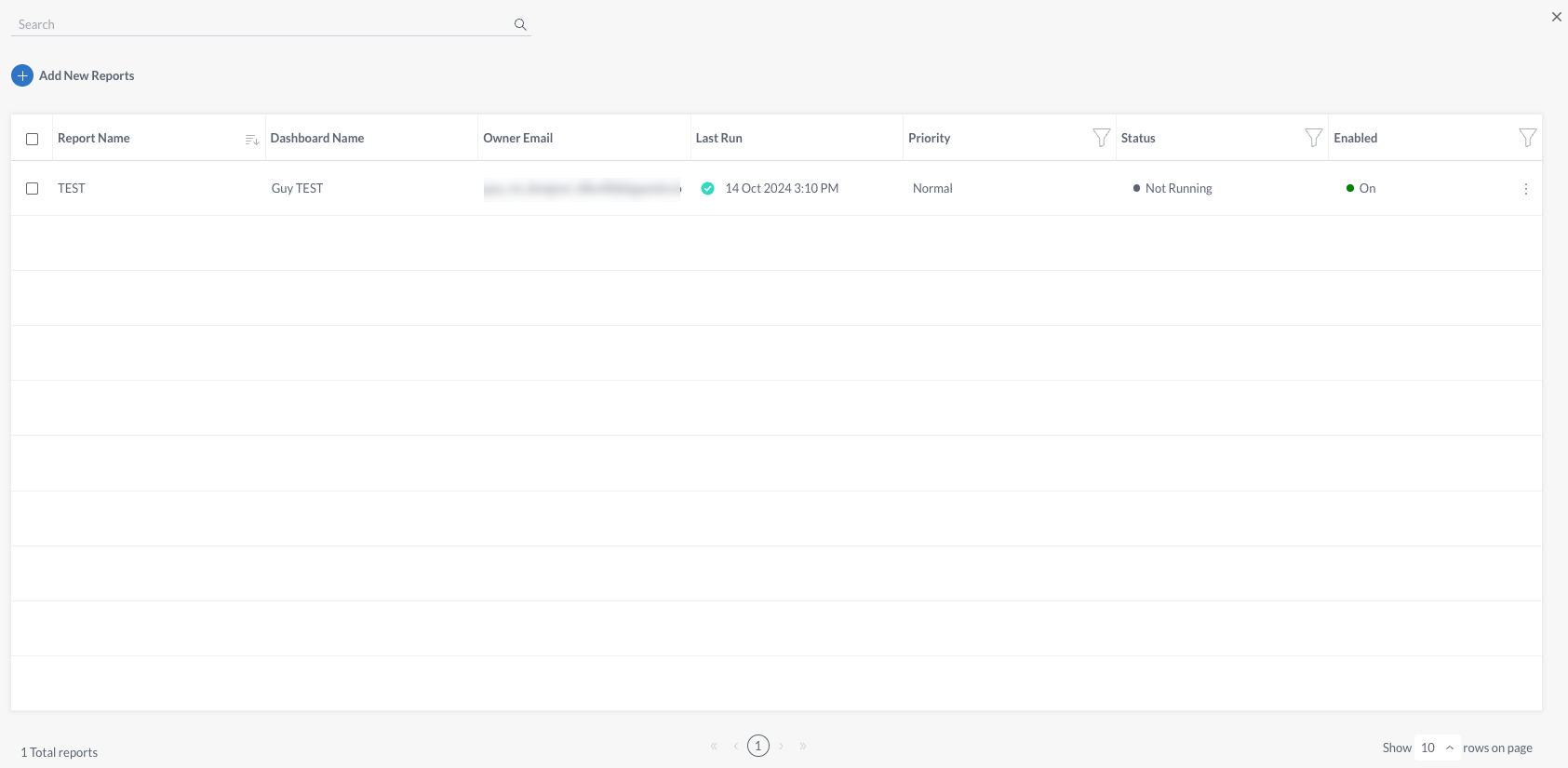
See the Report Manager documentation for more information.
BigPanda Smart Search
The new BigPanda Smart Search will help you save time during incident triage and remediation by letting you search with natural language instead of translating your query into a strict format.
BigPanda Smart Search is available for the incident feed and a new Slack app. It will be available in Unified Search in the future.
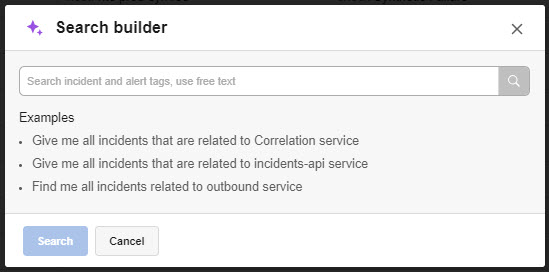
BigPanda Smart Search Builder
Read more about searching or adding the slack app in the BigPanda Smart Search documentation.
Limited availability
This feature has limited availability. If you are interested in enabling this functionality for your organization, contact your BigPanda account team.
Maintenance Plan Management Improvements
Find, view, and manage maintenance plans quickly and easily with new improvements to the Manage Planned Maintenance settings page and API.
Filter plans by normalized statuses
Planned: The plan is scheduled to run at a future time, but is not currently suppressing alerts.
Running: The plan is currently suppressing matched alerts.
Done: The plan suppressed matched alerts in the past, but is not scheduled to run again.
Filter plans by frequency type (recurring or one time), or search for plans by name or description.
Sort plans based on several key attributes: Last updated, Updated, Last created, Created, Next Run.
Improved pagination, sort options, and queries for the Retrieve All Plans API.
Read more about the UI in the Manage Planned Maintenance, or the API in the Retrieve All Plans V2 Endpoint documentation.
API Key Expiration Dates
To increase security, you now have the option to set expiration dates for API keys. Expiration dates are controlled from the BigPanda settings screen and can be extended at any time.
Existing keys
API keys created before this feature was released will have no expiration date. No action is needed for existing keys, they will continue to have no expiration date unless you decide to add one.
See the API Key Management documentation for more information.
Alert Correlation Dashboard
The Alert Correlation Dashboard is now available in Unified Analytics. This dashboard helps you gain insights into how alert correlation impacts different parts of your business, see trends in alert correlation, and measure correlation effectiveness across your monitoring sources.
See the documentation for more information.
BigPanda Mean Time To Resolve (MTTR) Dashboard
The BigPanda Mean Time To Resolve (MTTR) dashboard is now available in Unified Analytics. You can use this dashboard to see how your BigPanda incident MTTR is trending, see the sources of your highest and lowest duration incidents, and find areas for improvement.
See the documentation for more information.
Microsoft Teams Workflows Integration
Microsoft has retired the Office 365 connectors feature from Microsoft Teams, replacing it with Automate Workflows. All new MS Teams integrations should use the MS Teams Workflow instructions to configure sending MS Teams messages from BigPanda incident shares.
All existing MS Teams integrations must be migrated to the new workflow integration before the connectors are fully retired in January 2024. A new workflow must be created, and connected as a new MS Teams integration.
During this migration, all Microsoft Teams AutoShares need to be moved to the new integration. Follow the instructions on the MS Teams Workflow Migration documentation to migrate AutoShares to Teams Workflows.
Please reach out to your account team with any questions about migrating to the new workflow integration.
ServiceNow 2.9.2 & Similar Incidents in ServiceNow
This integration version surfaces Similar Incident data right in ServiceNow, allowing you to easily understand recurring issues and accelerate the incident resolution process. Organizations with the Advanced Insight Module who enable similar incidents will see a list on the incident form with the identified Similar Incidents.
All integration versions 2.8+ have been tested and are compatible with the latest Xanadu ServiceNow version.
Adjusted permissions on RCC and Similar incident tables to allow ITIL users to view.
For organizations already on 2.9.0 or 2.9.1, upgrade to 2.9.2 using the update link in the top app description. Organizations on versions below 2.9 will need to first upgrade the app to the 2.9.1 version.
Read more about upgrading your integration in the Update the BigPanda ServiceNow App documentation.
Deprecating Functionality
Classic Incident Console Deprecation
The New Incident Console delivers an intuitive incident feed with improved usability and performance, allowing you to accelerate your incident management workflow. As of June 2024, the updated interface became the default.
The option to switch back to the classic console will no longer be available on January 31, 2025. We invite you to take advantage of the improved features of the new console. Please see the documentation for more information.
MS Teams Connectors
Office 365 connectors have been replaced with Automate Workflows. All previous MS Teams integrations must be migrated to the new workflow integration before January 31, 2025.
September 2024
New Features Released in September 2024: Similar Incidents Redesign, Dynatrace Topology Improvements, Destination Tags API, and Sandbox Data Retention.
Similar Incidents Redesign
The Similar Incidents tab has a new and improved look. You can now easily see all of the crucial information you need in one place, saving you extra clicks.
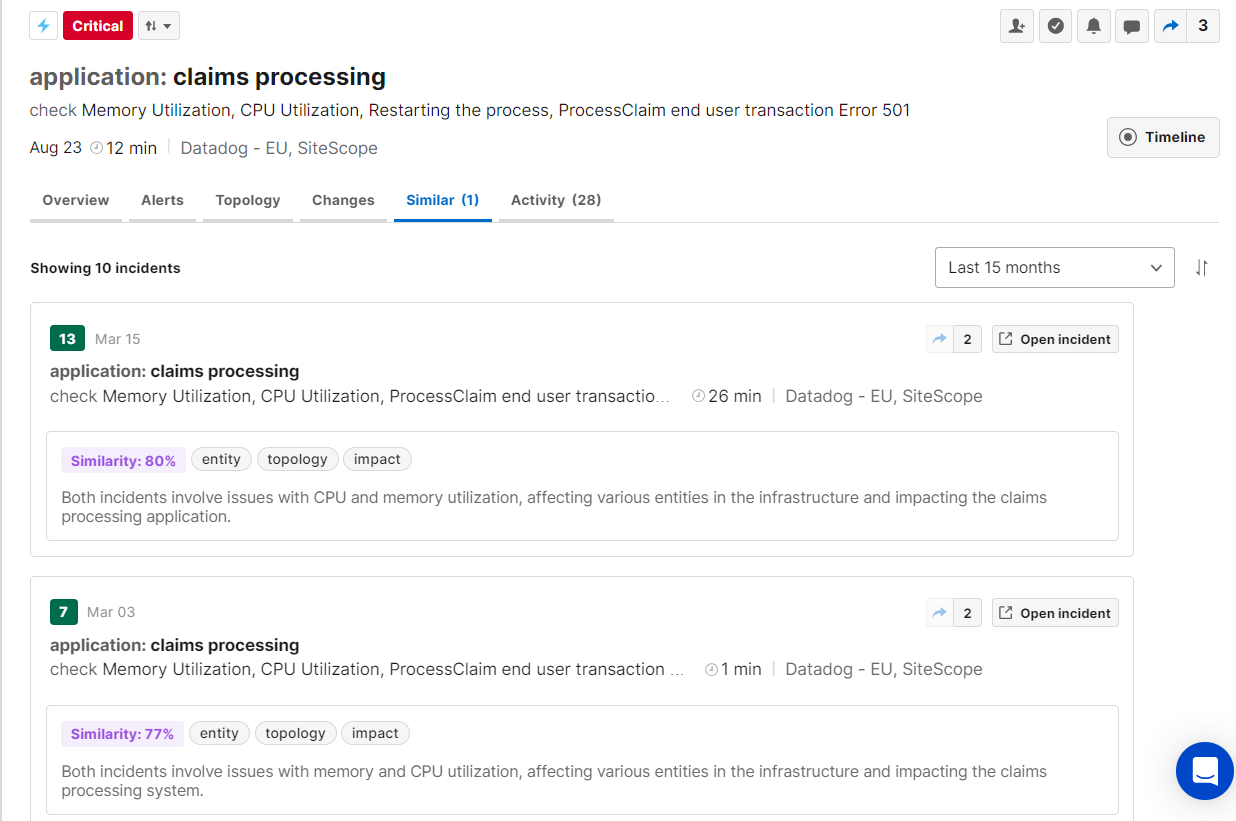
See the Similar Incidents documentation for more information.
Dynatrace Topology Improvements
Connect Dynatrace to BigPanda to automatically enrich incidents with up to date topology information.
The BigPanda Dynatrace Topology integration now supports v2 API subscribe paths for improved connection and robust functionality. Improvements through the /v2/subscribe route include additional entity maps for Process Group, Process Group Instance, and Custom Devices entities.
In addition to the /v2/subscribe endpoint, this update adds new options available for both v1 and v2 integrations:
A new optional
excludeobject to the subscription call for both v1 and v2 integrations. Theexcludeobject allows you to define a set of tags that should not be ingested into BigPanda. Add tags that are irrelevant or do not meet BigPanda's character limits or tag requirements to improve incident enrichment.New
dynatrace_<entity type>tag to identify which entity type populated the map.
Read more about the integration capabilities and standard mapped entities in the Dynatrace Topology documentation.
Caution During Upgrade
To upgrade your Dynatrace Topology integration to leverage the v2 subscription route, you must DELETE the v1 subscription.
Microsoft Teams Workflows Integration
Microsoft has retired the Office 365 connectors feature from Microsoft Teams, replacing it with Automate Workflows. All new MS Teams integrations should use the MS Teams Workflow instructions to configure sending MS Teams messages from BigPanda incident shares.
All existing MS Teams integrations must be migrated to the new workflow integration before the connectors are fully retired in January 2024. A new workflow must be created, and connected as a new MS Teams integration.
During this migration, all Microsoft Teams AutoShares need to be moved to the new integration. Follow the instructions on the MS Teams Workflow Migration documentation to migrate AutoShares to Teams Workflows.
Please reach out to your account team with any questions about migrating to the new workflow integration.
Destination Tags API
Troubleshoot and configure robust alert enrichment for integrations with the new Destination Tags API. Use this API to retrieve tags that were recently ingested and normalized by monitoring integrations. Integration source filters and pagination allow for deep investigation, helping you quickly optimize your integration configurations.
Read more in the Destination Tags API documentation.
Sandbox Data Retention
In line with our commitment to efficient data management and in accordance with the BigPanda Data Retention Policy, data retention periods in sandbox environments will soon be enforced.
For non-production environments, data older than 100 days will be removed on October 21, 2024. Moving forward, data retained in sandbox environments will not exceed three months. This change does not affect production data.
If you have any questions or concerns, please contact your BigPanda Account Team.
System Improvements
In the Change Details module, all tags following the Diff tag now appear alphabetically.
Four new columns tracking AIA and incident action information were added to the Standard Data Model INCIDENTS table. The new columns are IS_AIA_ACTIONED, FIRST_AIA_ACTION_DATE, IS_ACTIONED, and FIRST_BILLABLE_ACTION.
Automated Incident Analysis now runs on GPT-4o, offering improved performance and analysis capabilities.
EU customers who have the Advanced Insight Module can now choose to use Azure OpenAI as their LLM service in BigPanda. Contact your account team for more information.
Generating alert correlation previews is simpler than ever with a convenient Preview Correlation button to generate or update the preview.
Improved sharing backend to handle message processing during concurrent processing of AutoShares. This update eliminates issues related to duplicate incidents, gives improved bandwidth during event surges, and allows for better scaling.
As of October 2024, new OIM integrations will not flatten arrays by default. Existing integrations will not be affected by this change. If you would like to turn off array flattening for an integration created before October 2024, please reach out to support to update the array flattening setting.
Deprecating Functionality
The Getting Started Tool is being deprecated so that we can better meet the needs of operators and admins. Support for this feature ended September 1st, 2024. End of life for this feature is October 1st, 2024. If you have any questions or concerns, please reach out to your account team.
August 2024
New Features Released in August 2024: Resizable Live Dashboard Widgets, ServiceNow v2.9.1, and Unified Dashboard Reorganization
Resizable Live Dashboard Widgets
You can now customize the look and feel of your Live Dashboards by resizing widgets.
To resize a widget, hover over the upper right corner of the widget and click the Resize Widget icon. From the list, select between XSmall, Small, Medium, or Large.
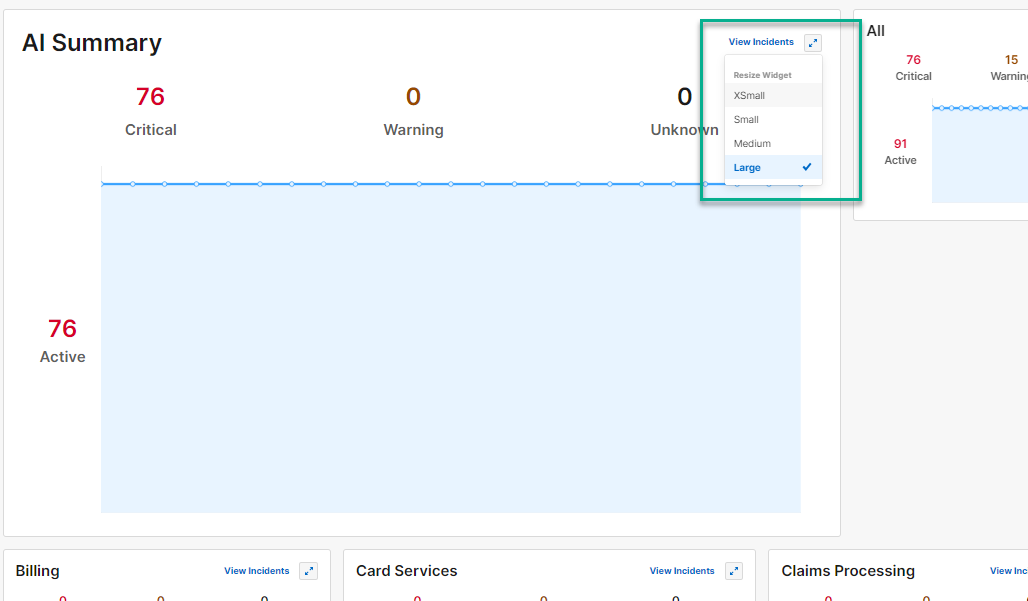
v2.9.1 (Sep 5, 24)
The ServiceNow version 2.9.1 deepens the integration with BigPanda incidents and improves the usability of cross-platform data in ServiceNow.
A new menu item Active Incidents lists active incidents synced to BigPanda and gives you access to a BigPanda view so you can access detailed tabs without changing your standard incident list. Available tabs in the BigPanda view include:
The Automated Incident Analysis tab includes the AIA summary generated in BigPanda (for orgs with the Advanced Insight Module).
The BP Alerts tab provides a real time view of BigPanda alert data. These alerts used to be added to the incident description but can now be accessed in a much cleaner view. This data can also be added to the ServiceNow Alert Table. Talk to your BigPanda account team about enabling this feature.
The Incident Tasks tab improves visibility and accountability by listing all alerts where the task tag is set to
true.The Root Cause tab will show you changes matched with the incident through Root Cause Change Analysis
The Activity tab displays work notes and the activities log for the incident.
The Resolution tab allows you to add codes, notes, and other resolution details to the Incident.
The Task SLAs, Affected CIs, Impacted Services/CIs, and Child Incidents tabs now connect to BigPanda alerts.
Related link buttons make it easy to take action or view data in BigPanda with just a click.
You can now access individual alert records from the BP Alerts table through Alert Processing - Addon menu. The Description field for these records include all alert data sent from BigPanda, including status, source, configuration item, assignments, and all alert tags.
Alerts that cannot match the alert hostname or CI to the CMDB will appear in their own table to provide better awareness for troubleshooting.
Missing alert hosts can be configured to automatically be added to the CMDB via CI Discovery.
Additional advanced configuration options for alerts enable you to customize what data you receive in the BP Alerts table.
New script includes drive automation and AI features:
BigPandaAIM script include - provides processing for RCC and AI features
BigPandaAlert script include - processes alert data for alert tables
Unified Analytics Dashboard Reorganization
The Unified Analytics dashboard selection pane has been reorganized into category folders based on business value, making it easy to find exactly what you need.
The new folders category folders are called Platform Summary, Product Adoption, and Product Outcomes.
See the Unified Analytics Standard Dashboards documentation for more information.
System Improvements - August 2024
To improve UI performance, only the most recent 2,000 comments on an incident are searchable. To retrieve the full comment history for an incident, use the Retrieve Incident by ID API.
Maintenance plans are now case insensitive.
BPFL Now supports a Concatenate function to combine two or more strings together.
Deprecating Functionality
The Getting Started Tool is being deprecated so that we can better meet the needs of operators and admins. Support for this feature ended September 1st, 2024. End of life for this feature is October 1st, 2024. If you have any questions or concerns, please reach out to your account team.
July 2024
New Features Released in July 2024: Incident Feed View Customization, Open Analytics Hub, Environments API Updates, and more.
Incident Feed View Customization
To effectively triage incidents and reduce your MTTR, you need to see the information most critical to your team at a glance. The new Incident Feed View Customization feature allows you to customize the incident feed tags that appear in the table view, so that the information most relevant to you is always visible.
With this change, you can also resize columns in the incident feed, making important tags easy to see.
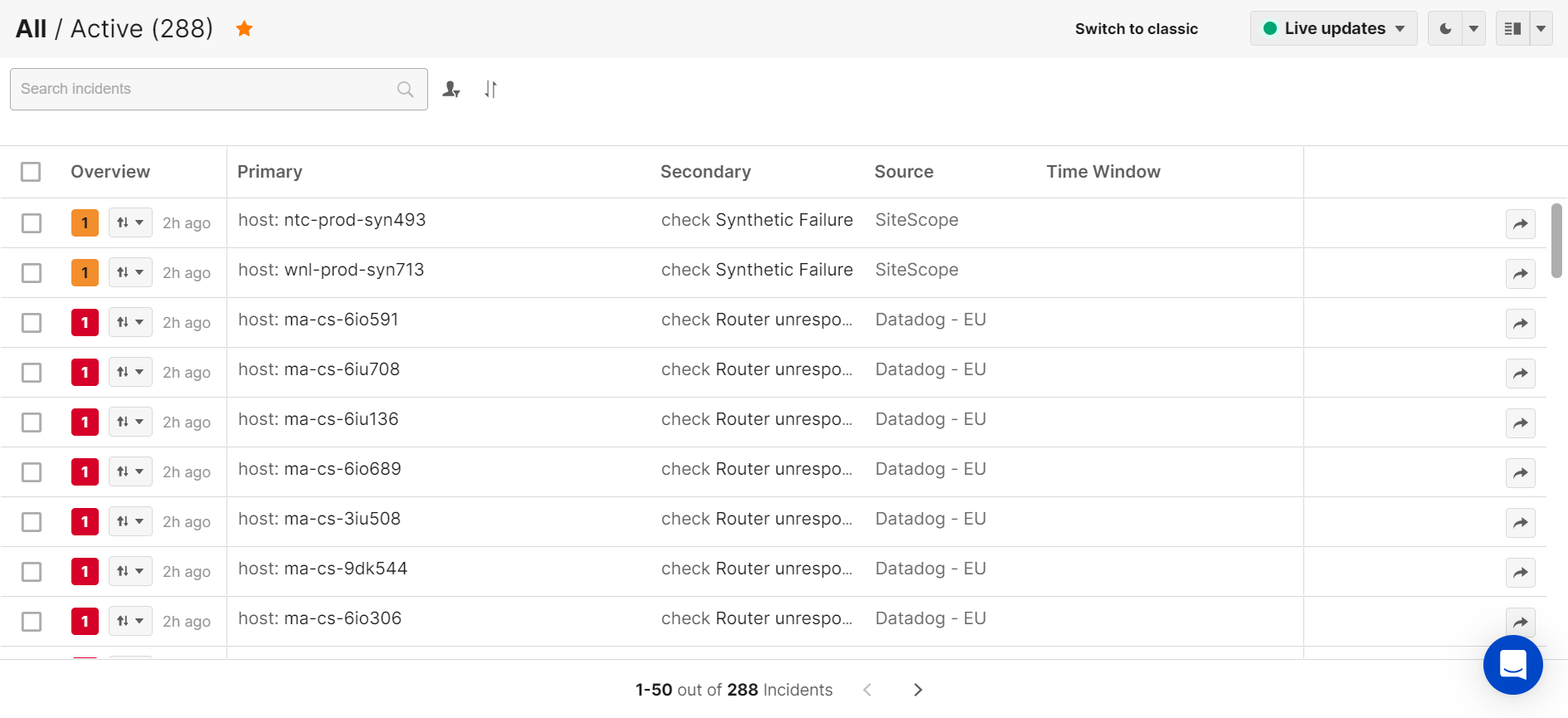
Customized Incident Feed View
The Incident Feed View Customization feature is currently available in a limited release. If you'd like to enable this functionality, contact your BigPanda Account Team.
See the Manage Incident Feed Views documentation for more information.
Open Analytics Hub
The Open Analytics Hub is now available to organizations using the Standard Data Model. The new interface enables you to directly query and export your BigPanda raw data from Snowflake, which powers Unified Analytics. You can then combine it with your other operational data, build your own analyses using external tools, and control the structure of your data in a way that best suits your organization's needs.
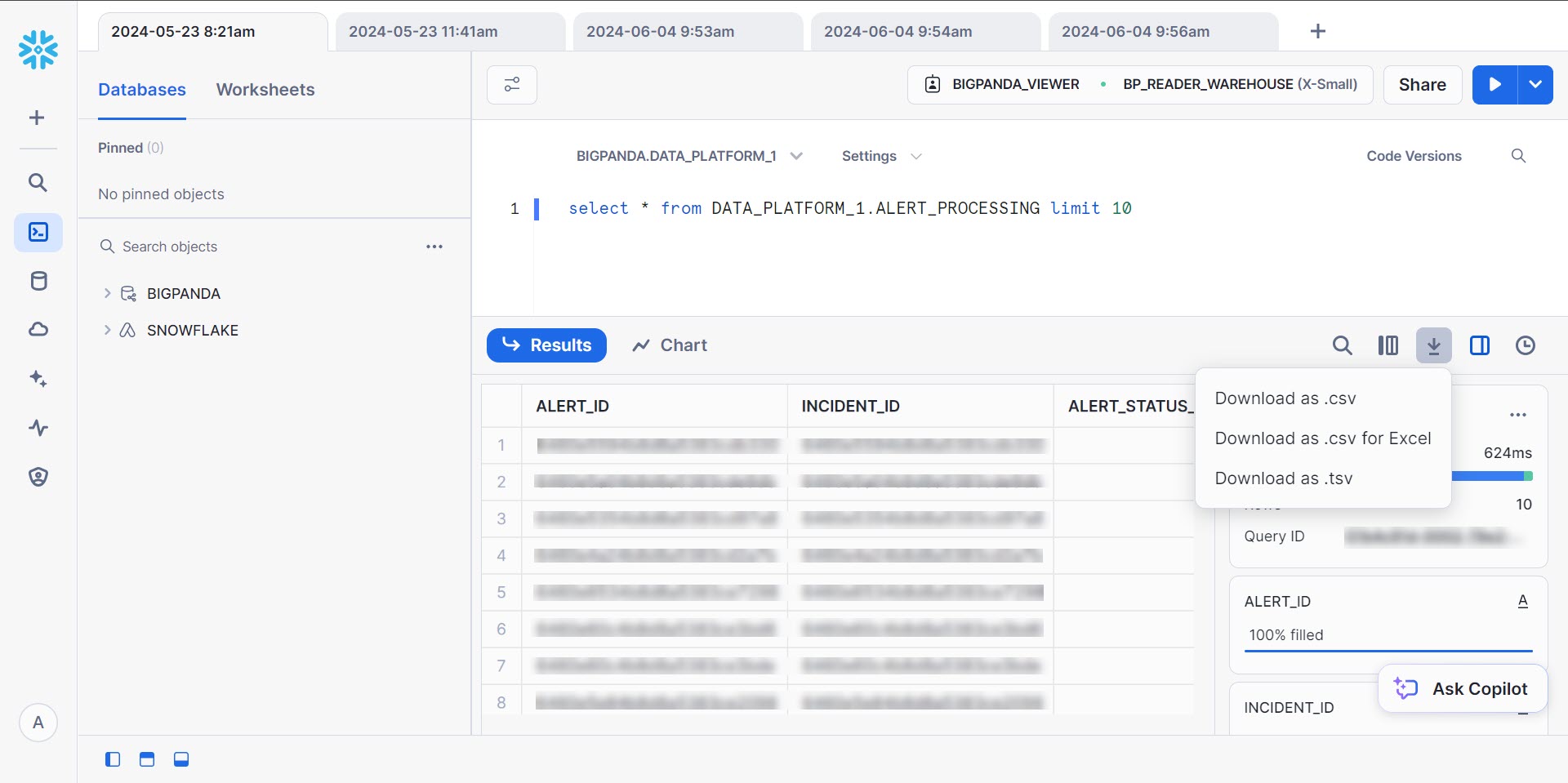
Open Analytics Hub
The Open Analytics Hub is currently available in a limited release. If you'd like to enable this functionality, contact your BigPanda Account Team.
Environments API Updates
The Environments API is now fully aligned with UI capabilities in customer sandboxes. This update drives efficiency for admins and users with the ability to perform updates at scale.
Using the API, you can now create, retrieve, update, and delete environment groups, update environment descriptions, and assign and retrieve roles for environments.
This update is currently available in sandboxes only and will soon be rolled out to production accounts. See the Environments API Updates page for more information.
System Improvements - July 2024
To improve dependency-based correlation, the maximum number of tag values matched in an array has been raised from 15 to 30.
Audit logs are now available for tracking changes to API keys, JIT provisioning, roles, SSO configuration, SSO testing, and SAML attribute mapping. See the Audit Log documentation for more information.
(Beta) Maintenance plans now support time zone parameters in both the UI and API. Timezones will automatically adjust for Daylight Savings Time. Contact your BigPanda account team if you'd like to try this feature in your production instance.
Deprecating Functionality
As part of our commitment to reducing noise and improving the user experience, we're retiring tag suggestions in Open Integration Manager. Organizations using that feature will now no longer see automated suggestions when they create a new integration. The default configurations will now align with the default parameters supported with BigPanda's legacy Alerts API.
The Open Integration Manager v1 API configuration can no longer be used for new integrations. The OIM v2 configuration is fully available for all accounts, including those created before 2023. Existing OIM v1 configurations will continue to function, but new features won't be supported on this version, and bug fixes may or may not apply to v1 configurations.
The Getting Started Tool is being deprecated so that we can better meet the needs of operators and admins. Support for this feature will end October 1st, 2024. End of life for this feature is December 31st, 2024. If you have any questions or concerns, please reach out to your account team.
June 2024
New Features Released in June 2024: New Incident Console, Suspected Root Cause Summary, Similar Incidents improvements, and more.
New Incident Console
The New Incident Console is now the default interface upon login. The new version of the console brings you:
improved load times
streamlined design
dark mode
custom layouts
select-all functionality
and more!
The option to switch back to the classic version of the console is still available. See the New Incident Console documentation to learn more.
Advanced Insight Module Features
BigPanda’s Advanced Insight Module accelerates incident analysis with contextualized data, helping you understand the impact and underlying causes in real-time.
If your organization has not purchased this module, you may not have access to these features. If you are interested in upgrading to the Advanced Insight Module, contact your BigPanda account team.
Suspected Root Cause Summary
BigPanda now offers detailed, AI-generated summaries of Root Cause Changes that explain why BigPanda marked a change as a suspected root cause. This easy-to-read summary provides more context and better insights into matches, saving you time as you hunt down the root cause of an incident.
Similar Incidents UI Improvements
It's now even easier to see details about Similar Incidents in the BigPanda console. With recent improvements to the Similar Incidents Tab in the UI, you can now:
See how many incidents were similar to the selected incident with a number indicator on the Similar tab.
View shares and comment information associated with a similar incident within the Similar tab.
See the Similar Incidents documentation for more information.
Integration Improvements
A new optional callback service for Notifications Webhook integrations improves bidirectional stability.
System Improvements
BPFL now supports clickable links with URL syntax
Maintenance plan and alert filter conditions are now case insensitive.
The
alert_updatestag is now able to handle events that arrive at BigPanda out of order.
Deprecating Functionality
As part of our commitment to reducing noise and improving the user experience, we're retiring tag suggestions in Open Integration Manager. Organizations using that feature will now no longer see automated suggestions when they create a new integration. The default configurations will now align with the default parameters supported with BigPanda's legacy Alerts API.
The Open Integration Manager v1 API configuration can no longer be used for new integrations. The OIM v2 configuration is fully available for all accounts, including those created before 2023. Existing OIM v1 configurations will continue to function, but new features won't be supported on this version, and bug fixes may or may not apply to v1 configurations.
The Getting Started Tool is being deprecated so that we can better meet the needs of operators and admins. Support for this feature will end October 1st, 2024. End of life for this feature is December 31st, 2024. If you have any questions or concerns, please reach out to your account team.
May 2024
New features released in May 2024: Customize Post-Maintenance Plan Behavior, Real-Time Dashboards Update, updates to Unified Analytics, and more.
Customize Post-Maintenance Behavior
You can now customize the action BigPanda takes with suppressed alerts when a maintenance window ends. With this added functionality, you'll have the option to leave alerts in maintenance (default), resolve all suppressed alerts, or reactivate all suppressed alerts.
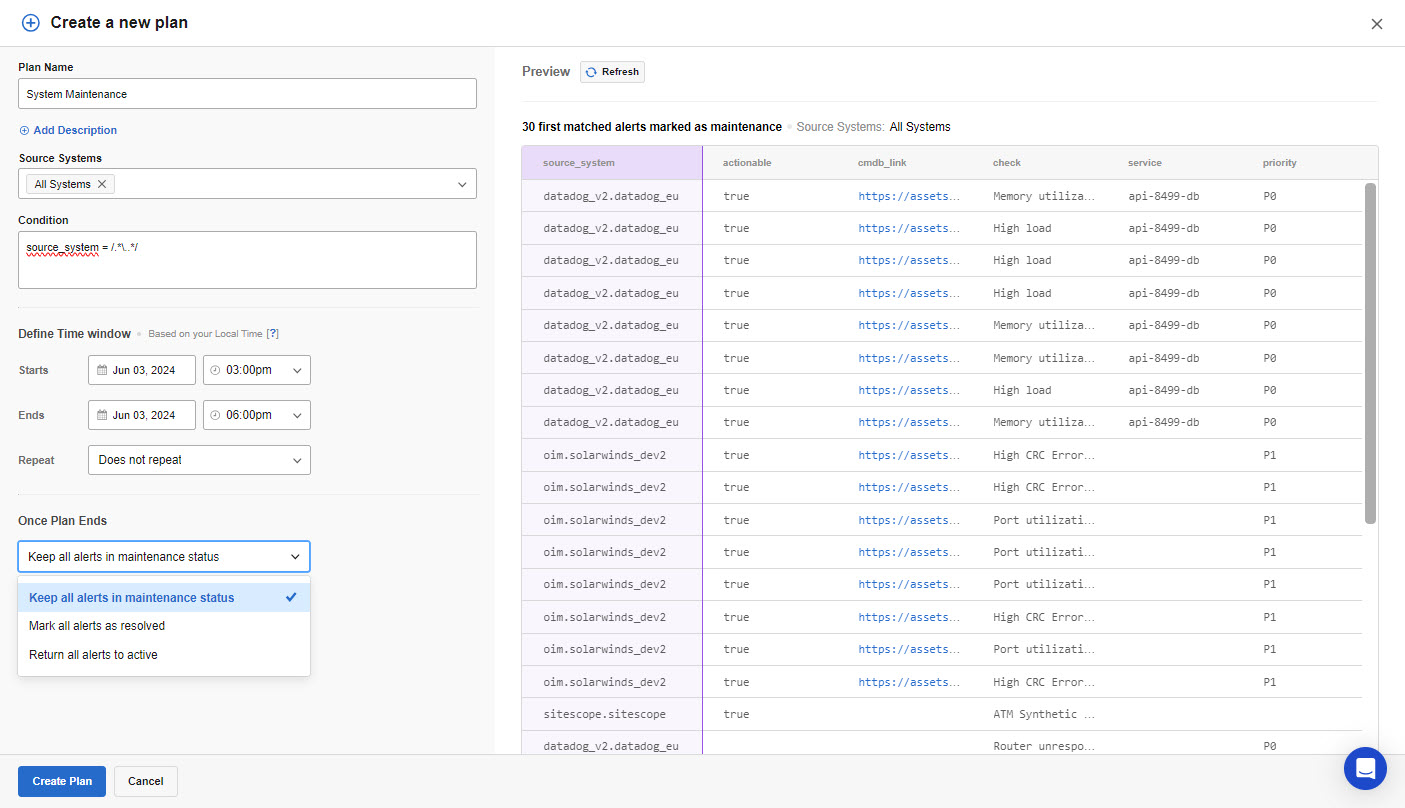
This feature is currently available in a beta release. If you are interested in enabling this functionality for your organization, contact your BigPanda account team.
See Manage Planned Maintenance for more information.
Real-Time Dashboards Update
The Dashboards tab now has an updated look. As part of this update, you can now filter the list of dashboards to find exactly what you need.
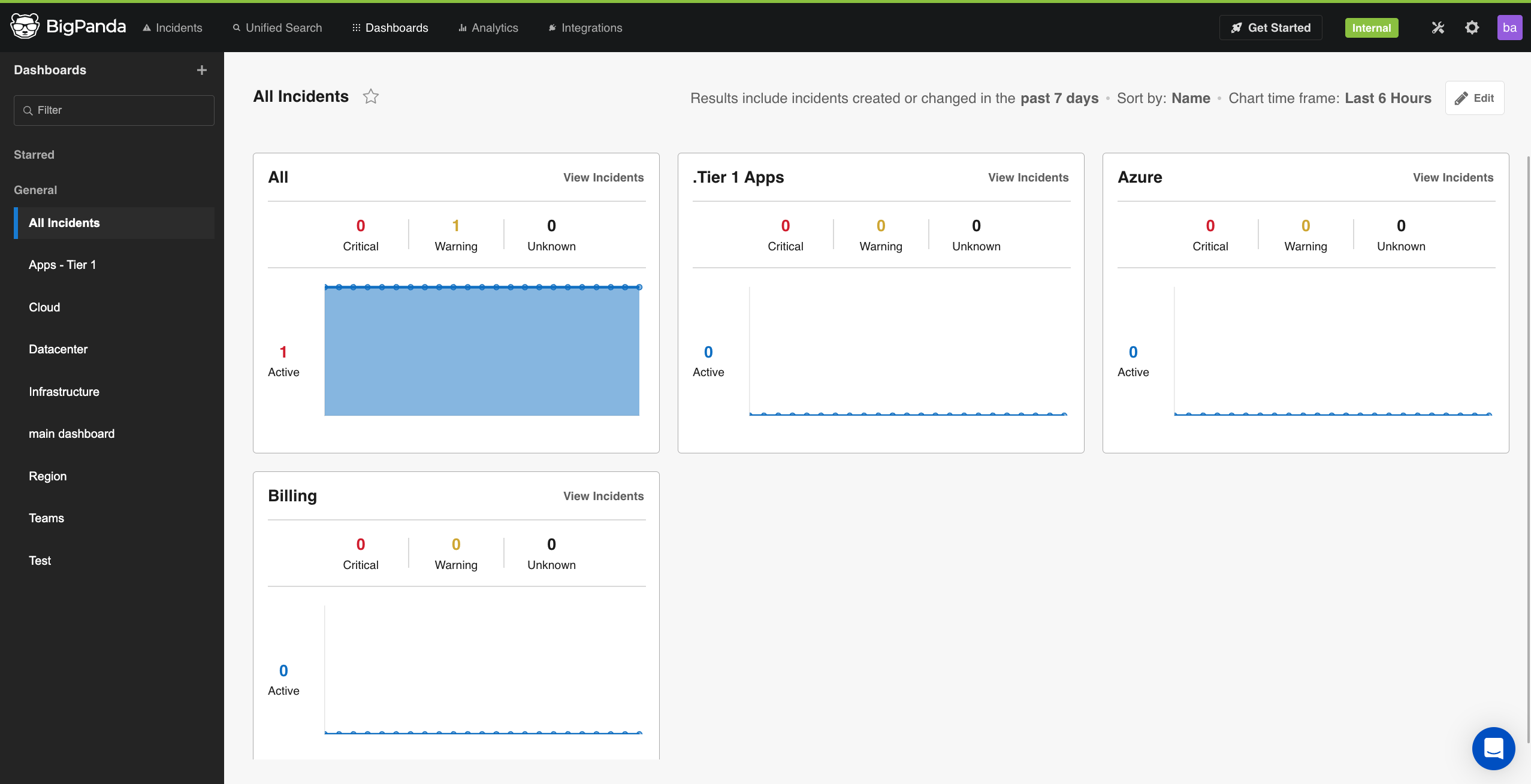
New Real-Time Dashboards
See the Dashboards Tab documentation for more information.
Unified Analytics Reactivation
Unified Analytics was re-enabled for most customers on May 28th. All features of Unified Analytics are once again available, including data from the inactive period.
Unified Analytics will remain inactive if your organization requested that it not be re-enabled. If you would like to turn it back on, contact your BigPanda Account Team.
Unified Analytics Standard Data Model
The updated Unified Analytics standard data model is now available. The new model contains additional reporting data tables based on incident tags and maintenance plans, and additional time zone fields.
For more information, see the Unified Analytics Standard Data Model documentation.
This feature is currently available to new BigPanda customers and is being gradually rolled out to all organizations. If you'd like to enable this functionality, contact your BigPanda account team.
Integration Improvements
You can now populate BigPanda correlated alerts into a tables within the ServiceNow interface, making it easier to view, sort, and filter your alert data.
System Improvements
A new system tag, Alert_Updates, tracks the number of updates made to an alert between its creation and the latest update. This tag gives you visibility into the number of events merged into a single alert, and allows you to prioritize incidents based on update frequency. The alert_updates tag is also included in AutoShares.
The Activity Tab was added to the V2 console.
Color contrast improved in the UI to better support users with visual disabilities.
Any updates to maintenance plans and alert filters will now appear in the audit logs.
Maintenance plans can now be previewed on the plan creation screen.
April 2024
New features released in April 2024: Time Zone Customization, Advanced Insight Module, Similar Incidents, and more.
Time Zone Customization
You can now adjust your time zone and date formatting within the Personal Settings page in BigPanda. These settings only apply to your account.
This feature is currently available in a limited release. If you are interested in enabling this functionality for your organization, contact your BigPanda account team.
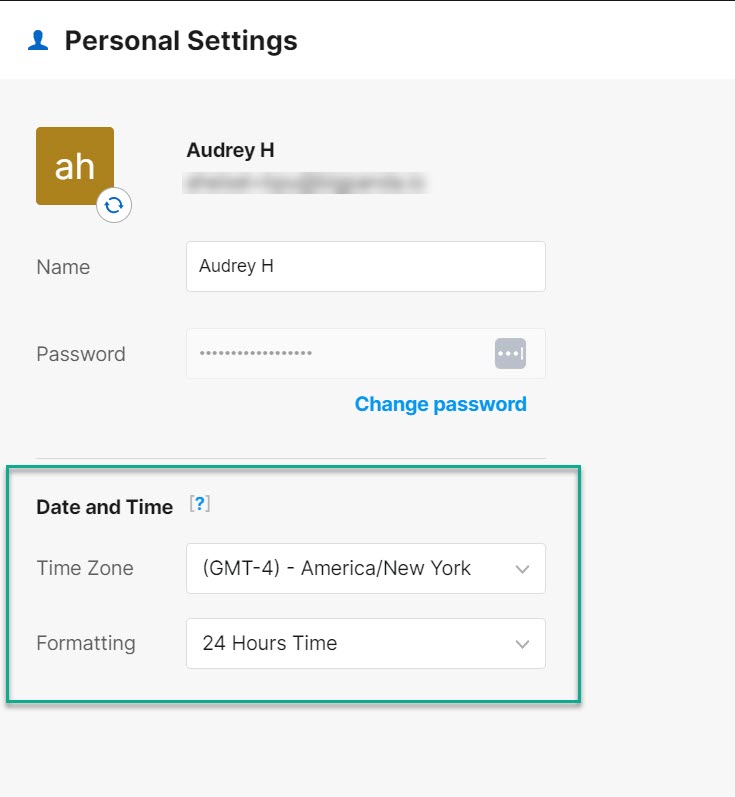
Date and Time Customization
Date and Time Customization Availability
Date and time customization settings do not currently apply to the Audit Log and Unified Search screens.
See the Date and Time documentation to learn more.
Advanced Insight Module
BigPanda’s Advanced Insight Module accelerates incident analysis with contextualized data, helping you understand the impact and underlying causes in real-time. With this new module, you can:
Use data from your entire IT stack to generate context-rich summaries that describe priority, scope, and assignment teams.
Use past incident data to identify and predict escalation trends.
Correlate relevant multisource alerts with change data to identify probable root cause.
The Advanced Insight Module contains BigPanda's Automated Incident Analysis, Similar Incidents, and Root Cause Changes features. If you are interested in upgrading, contact your BigPanda account team.
Similar Incidents
Advanced Insight Module
This feature is part of the Advanced Insight Module. If your organization has not purchased this module, you may not have access to the feature.
If you are interested in upgrading to the Advanced Insight Module, contact your BigPanda account team.
The Similar Incidents tab is now available within the Incident Details pane. Similar Incidents give you insight into similar previous incidents without leaving the console. To deliver the most relevant incidents, similarity is defined by the affected entity, problem triggering the alert, system topology, and impact extent.
Similar incidents help reduce incident investigation time and MTTX and consider incident priority, involved teams , resolution steps, and more.
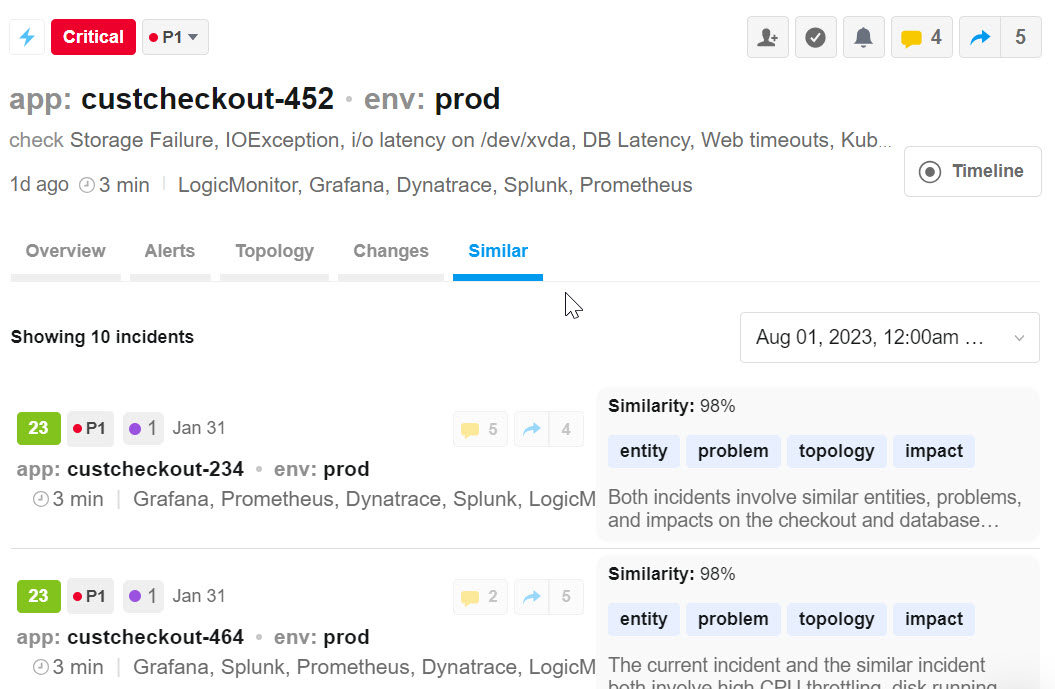
Similar Incidents
See the Similar Incidents page for more information.
Root Cause Change (RCC) Data in Automated Incident Analysis
RCC data can now be included in the automated incident analysis. This information can help you quickly understand how suspect changes might be responsible for incidents allowing for a faster Mean Time to Know (MTTK) and Mean Time To Resolution (MTTR).
This data is available in AIA by default for all customers who are new to BigPanda after April 2024. If you are an existing customer and would like your RCC data to be available in AIA, contact your BigPanda account team.
Integration Improvements
New OIM integration: Tivoli - Send monitoring data from IBM’s Tivoli to BigPanda.
Expanded Advanced configuration options for OIM by adding optional forced lowercasing and the ability to reuse the same source tag multiple times to define a single destination tag.
Collaboration integrations can now be deleted from the platform without assistance from support.
Improved security with a privacy toggle that conceals bearer tokens on all integrations screens.
System Improvements
Performance enhancements made to the Correlation engine to improve latency and throughput.
The look of the incident preview screen has been updated to match the new incident console.
Added a new alert tag to show the total number of post-deduplication events that make up the alert.
March 2024
New features released in March 2024: Activity Log Filter, Smart Defaults for Incident Tags, Correlation Pattern Run Order, and more.
Activity Log Filter
You can now find relevant activities without scrolling through the entire history of the incident. The activity log filter in the V2 Incident Console allows you to select specific event types to narrow the log so you can find exactly what you need.
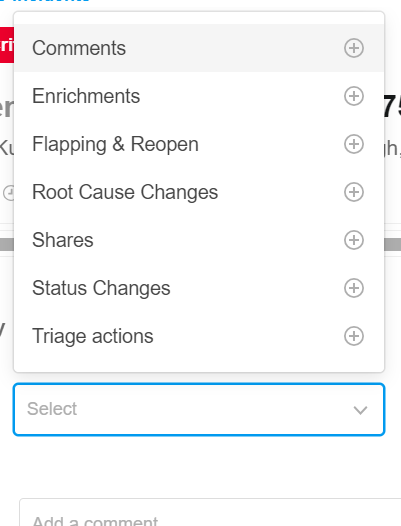
Activity Log Filter Options
See the Filter the Activity Log documentation for more information.
Smart Defaults for Incident Tags
Incident tags allow you to quickly see metadata for an incident without digging through the related alerts. These tags add contextual information, details, or other enrichment data sets to your incidents.
To make it easier to get the most out of incident tags, BigPanda now includes several configurable, system-generated incident tags by default. These tags are based on industry best practices and are designed to provide essential and actionable incident information.
New organizations (as of April 4th) will see these default incident tags in their Incident Enrichment screen, marked with a purple badge. If your organization onboarded with BigPanda before April 4th and you want to enable this functionality for your organization, contact your BigPanda account team.
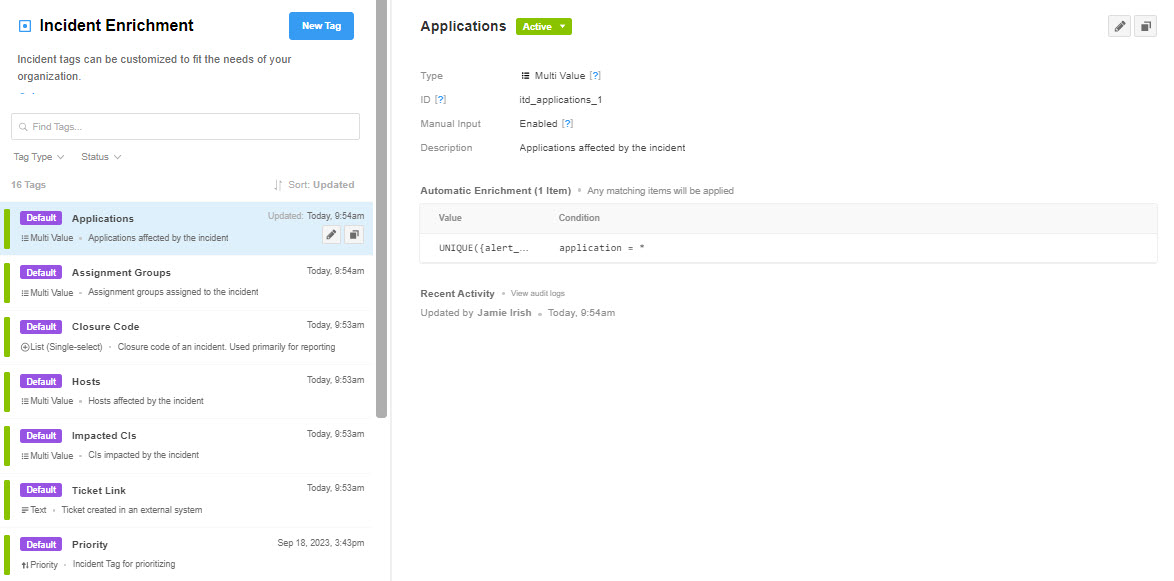
Smart Default Tags
To learn more, read our documentation on Smart Default Incident Tags.
Correlation Pattern Run Order
You can now manually define the run order for your correlation patterns. By default, patterns are automatically sorted from largest time window to shortest. While it's usually best practice to order by time window, there are scenarios where patterns with shorter time windows should be prioritized. You’ll now be able to customize the run order to best fit your unique system relationships.
See the Correlation Patterns Run Order documentation to learn more.
Maintenance Events in the Timeline
In the V2 Incident Console, you can now view maintenance events in the Incident Timeline.
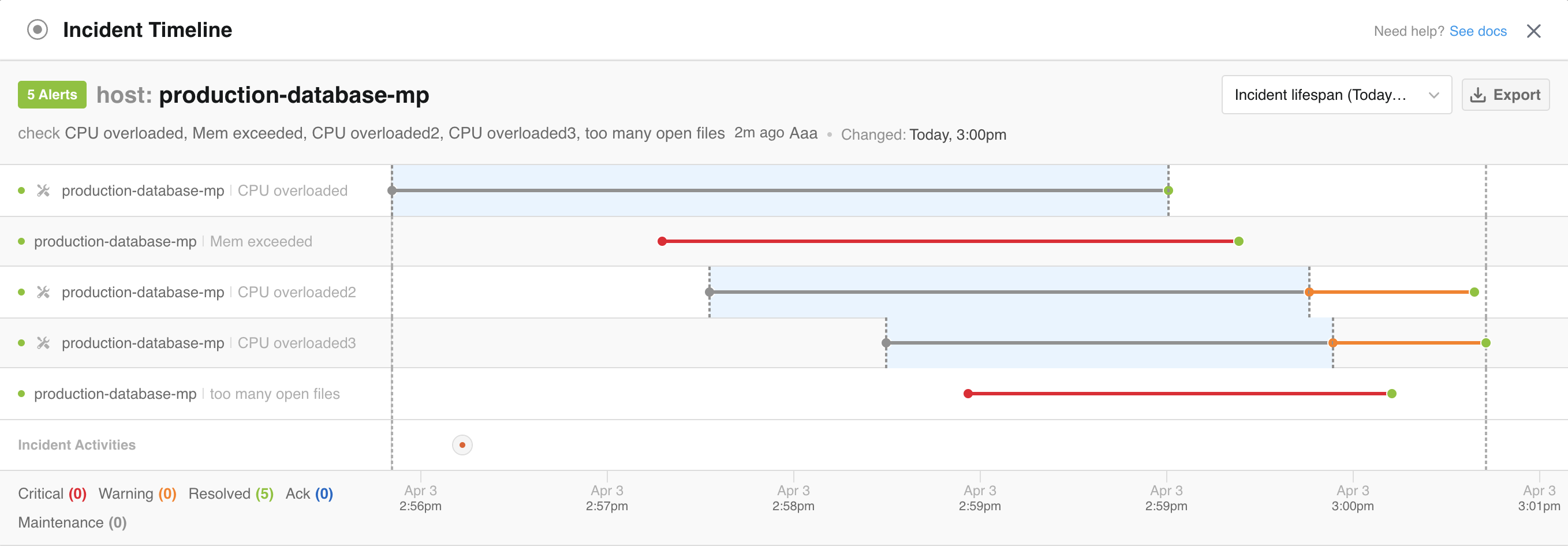
When an alert is suppressed by a maintenance plan, it will be marked with a grey status indicator on the timeline.
See the Incident Timeline documentation for more information.
Root Cause Changes (RCC) Suspect Score in Incident Details
It's now easier than ever to determine which change causation suspects are likely the root cause of your incidents. You can now see the causation score BigPanda assigned to change suspects right in the incident details pane. Changes with a higher causation score are the most likely suspects.
The score is available in the incident details pane within the Overview tab, Changes tab, and in the Change Details pane.
See the View the Change Suspect Score documentation for more information.
Integration Improvements
You can now include an optional human-readable timestamp in your integration payloads.
New OIM Integrations
System Improvements
Unified Analytics has been optimized to improve platform load times.
Automated Incident Analysis now runs on GPT-4-Turbo, offering faster performance and improved analysis capabilities.
Organizations using single sign-on (SSO) can now allow users with the Admin role to access BigPanda in the event of an SSO outage.
February 2024
New features released in February 2024: Suspected Changes Analysis, New Unified Search, ServiceNow Version 2.9, and more.
Suspected Changes Analysis
The Suspected Changes Analysis dashboard is now available in Unified Analytics. This dashboard shows you the number of suspected changes across incidents in BigPanda, as well as the impact on incident Mean Time to Resolve (MTTR). This information can help you fine-tune your RCC configuration, so your team can work even more quickly and effectively.
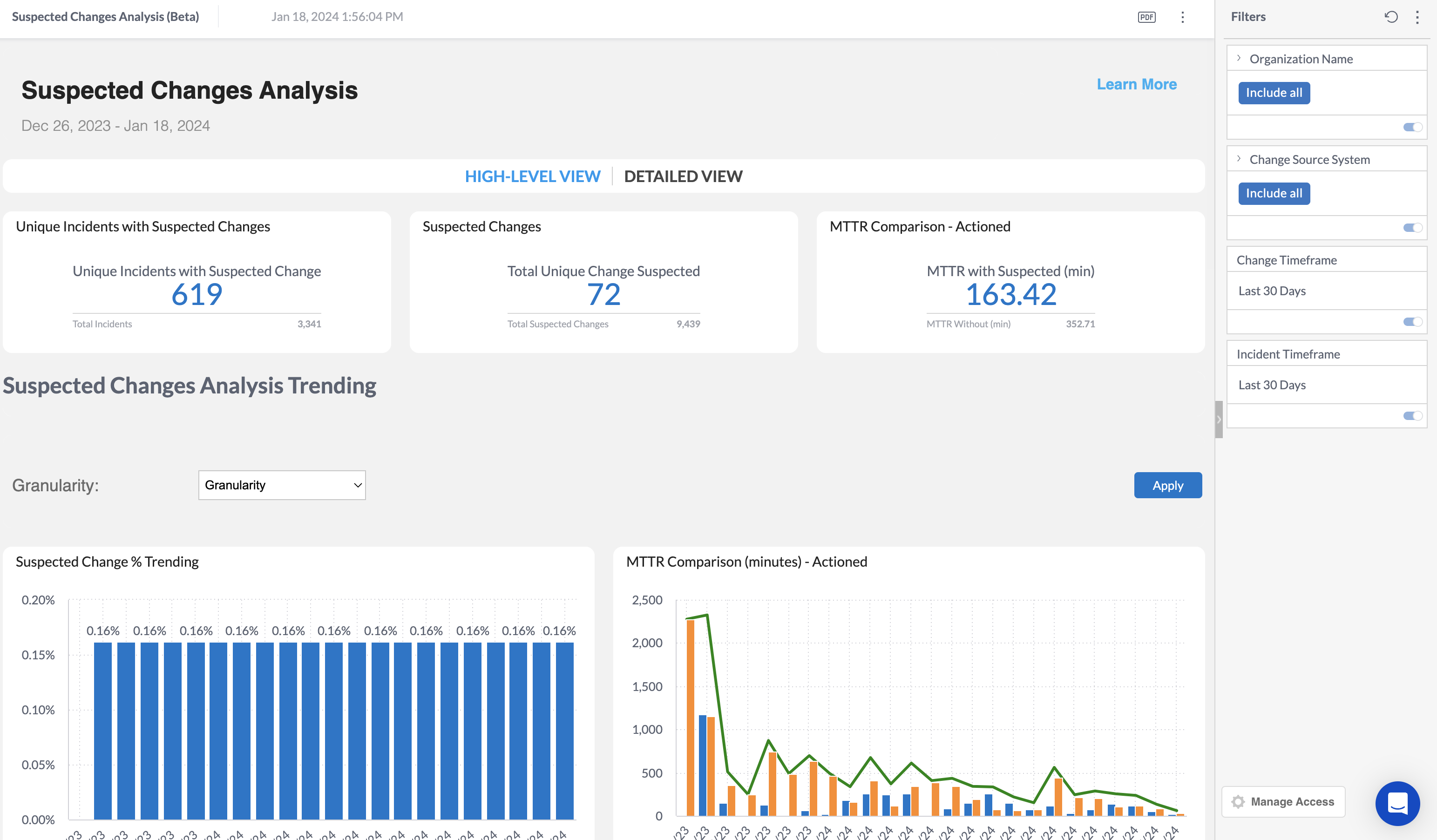
See the Suspected Changes Analysis documentation for more information.
New Unified Search
The new search functionality allows you to search based on tags and descriptive metadata so you can rapidly investigate and focus on the most important incidents. Unified Search provides more flexibility and usability to expedite triage and analysis.
New search functionality includes:
Search for incidents based on tags, such as Priority, incident ID, assignee, etc.
Search environments built with incident tags
Search with the Incidents API to identify candidates for improved automation workflows.
See the New Unified Search documentation for more information.
Integration Improvements
The ServiceNow integration version 2.9 is now available in the developer portal. This version improves the headless operator experience with Automated Incident Analysis and Root Cause Change added directly to SNOW tickets. It also streamlines and automates the collection of ITSM data between ServiceNow and BigPanda for improved incident reporting and analysis on value derived from use of AIOps.
OIM Improvements
Primary and secondary properties can now be configured separately in the OIM configuration UI for all customers, and are based on Destination tags instead of Source tags.
Source tags are no longer automatically converted to lowercase. This change does not affect Destination tags.
System Improvements
Just-In-Time (JIT) Provisioning is now available for use with Multi-Org Accounts in BigPanda.
Query Helper no longer appears in Changes search, to remove unrelated suggestions.
Deprecated Functionality
SCIM V1 API End of Life. V1 of the SCIM Users API has been retired as of February 19th 2024. The V2 SCIM Users API provides improved authentication, performance, and user experience. Read about migration best practices and functionality differences in the SCIM Users API Release Notes.
ServiceNow Application V2.2 and Earlier End of Life. As of March 1st 2024, existing workflows for application versions 2.2 and earlier will not function as expected. The latest versions of our application can be found in the ServiceNow Developer Portal.
January 2024
New features released in January 2024: BigPanda Community Simplified Sign On, Alert Tag Dropdown Cleanup, New Support Resource Page, and more.
BigPanda Community Simplified Sign On
To simplify account management, you can now access the BigPanda Community right from the BigPanda UI. In the upper right hand corner of the UI, click your account name and select Community from the drop-down menu. You’ll be automatically logged into your BigPanda Community account, no need for an extra sign in. If you have not already created a Community account, one will be automatically created.
Users accessing the BigPanda Community from outside of the BigPanda UI will still need to enter a username and password to log in.
Alert Tag Dropdown Cleanup
To streamline the user experience, outdated alert tags will no longer appear in UI dropdowns. Tag dropdowns in alert enrichment, correlation patterns, unified search, and environments configuration screens will only include alert tags that were updated or included in event payloads in the last 90 days.
Only UI dropdowns will be affected by this process. Historical alerts will retain their tags, and tag enrichment rules will still apply to future payloads.
New Support Resource Page
BigPanda continues to offer high-quality support to resolve technical issues and keep your BigPanda environment running effectively. The new Customer Support resource page gives you details on our support offerings and instructions on how to find the help you need.
Integration Improvements
Any updates to OIM integration configurations will now be logged in both UI and API audit logs.
System Improvements
UI updates ensure that snoozes can no longer be set for a duration longer than 90 days (the maximum snooze duration).